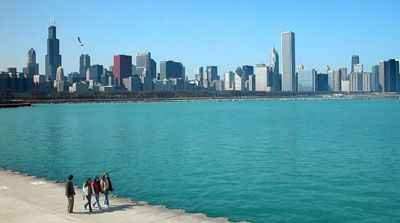The recent passage of the Great Lakes Compact, an historic interstate and international freshwater protection agreement, makes water supply planning even more important.
On Oct. 3, 2008, President George W. Bush signed the Great
Lakes Compact into law. The Compact, which had already been approved
by Congress, eight states, and two provincial governments, is intended to foster
“sustainable use and responsible management of
Great
Lakes
Basin
waters” through regional goals for
conservation and efficiency, and shared decision-making criteria for future
uses.

Perhaps most significantly, the Compact explicitly limits future diversions
of water. While this limit may have
been a response to past proposals to ship water to China or pipe it to golf courses in the
southwest, the local ramification is that it will be extremely difficult, if not
impossible, for northeastern Illinois to
increase its annual allocation of Lake Michigan
water in the future. However, while
our diversion will not grow over time (3,200 cubic feet of water per second),
the region’s overall population is growing, and with it the number of people
relying on Lake
Michigan water. As reported in Troubled
Waters, a 2005 publication of the Metropolitan Planning Council and
Openlands, the
population served by public water systems presently receiving
Lake Michigan water is expected to increase by
approximately 12 percent by 2020.
This means the time is now to
ensure the region’s future water supply.
This will require commitment to a threefold approach:
-
Planning – The Compact requires that states adopt a plan to
manage and protect water supply.
Fortunately, since 2005,
Illinois has been
moving
toward a statewide framework for regional water supply planning, but it has been slow-going.
Two pilot regional planning groups – in
northeastern
Illinois and
east central
Illinois – have completed regional demand analyses, but the state
recently cut funding to complete regional supply analyses.
County, municipal, and foundation
dollars have been cobbled together to complete the analyses, but sustained
commitment from the State of Illinois is necessary to ensure these pilot groups,
as well as those to follow, have the support and resources necessary to plan our
state’s water future.
In December 2008, the Metropolitan Planning
Council and Openlands plan to release a report recommending strategies to
support and strengthen this burgeoning planning effort.
-
Investment in infrastructure – Simply put, the
Chicago region needs a
plumber.
Many communities have
woefully old, outdated, and inefficient water piping systems, resulting in
substantial leakage and loss.
According to the
National
Drinking Water Clearinghouse, expected loss in
any water system is between 10 and 20 percent.
However, infrastructure maintenance,
repair, and modernization are often expensive propositions.
An upcoming
conference, co-hosted by the Metropolitan
Planning Council and
New York’s
Regional Plan
Association,
aims to set priorities for investment in water, energy, and transportation
infrastructure, and will focus directly on municipal water system
needs.
-
Efficiency and conservation – The best way to ensure
sustainable water supplies in the future is to use less today.
Part of this is simply changing daily
habits or upgrading technology, but a significant part of it is land use.
Communities built with greater proximity
between homes, jobs, parks, schools, and stores tend to use less water per
household.
A
land use impact
calculator developed by the San Francisco League of Conservation
Voters illustrates the denser a community, the less water it consumes.
While very few
states explicitly link land use decisions with the availability of water, since
the 2004 release of
Changing
Course by the Metropolitan Planning
Council and Openlands, we have advocating for exactly that.
Too often, it requires a drought
or flood to force people to think about water supply. With the passage of the Great Lakes
Compact, however, it is the guarantee of a steady, unchanging water supply that
compels us to take action today to ensure that our diversion is sufficient in
the years to come.
If
you have any questions about the Metropolitan Planning Council’s water supply
work, or would like to support future efforts, please contact Josh
Ellis at jellis@metroplanning.org or at (312)
863-6045.